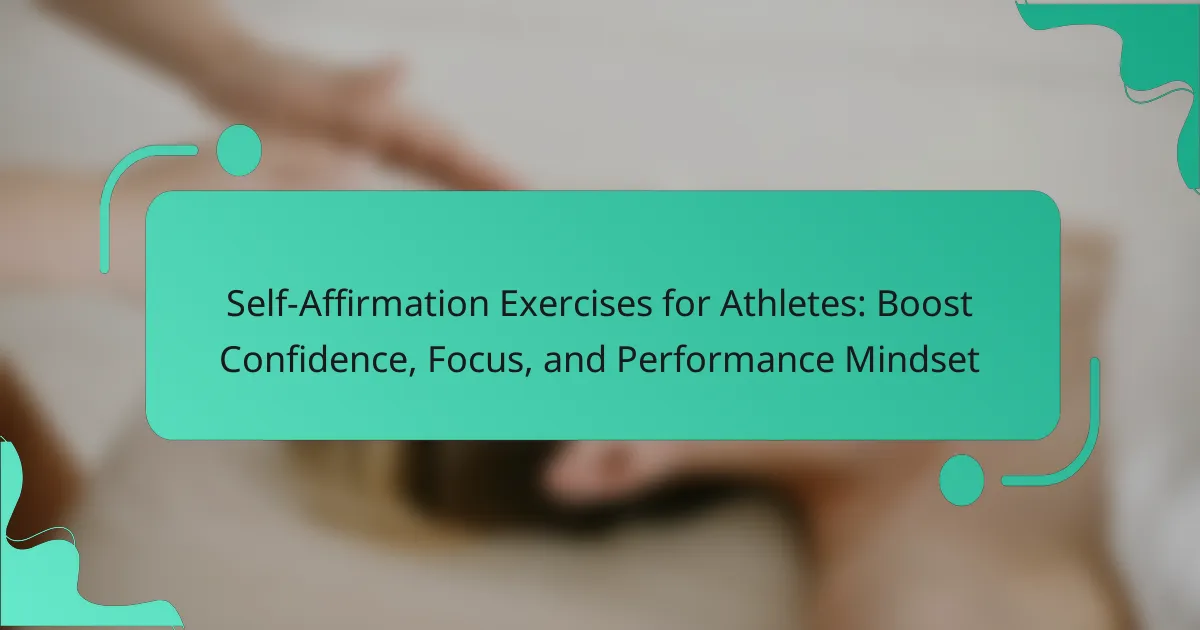Self-affirmation exercises for athletes boost confidence, focus, and performance mindset. These techniques include positive self-talk, visualization, and mindfulness practices. Regular engagement can enhance mental resilience and reduce performance anxiety. Athletes can measure the effectiveness of these exercises through self-assessment and performance metrics.

What are Self-Affirmation Exercises for Athletes?
Self-affirmation exercises for athletes enhance confidence, focus, and a performance mindset. These techniques involve positive self-statements that reinforce an athlete’s abilities and potential. Regular practice can lead to improved mental resilience and reduced performance anxiety. Research indicates that athletes who engage in self-affirmation report higher levels of self-efficacy and motivation. Incorporating these exercises into training routines can significantly impact overall athletic performance.
How do self-affirmations influence athletic performance?
Self-affirmations significantly enhance athletic performance by boosting confidence and focus. Research shows that athletes who practice self-affirmation experience reduced anxiety and improved resilience. This psychological strategy fosters a positive mindset, enabling athletes to overcome challenges effectively. Studies indicate that consistent use of self-affirmations correlates with higher levels of motivation and better overall performance outcomes.
What psychological principles support self-affirmation?
Self-affirmation is supported by psychological principles such as self-concept maintenance and cognitive dissonance reduction. These principles help athletes enhance their confidence and focus. Self-affirmation exercises reinforce positive self-views, allowing athletes to cope with challenges and improve performance. By affirming their core values and strengths, athletes can maintain motivation and resilience in competitive environments.

What are the universal benefits of self-affirmation for athletes?
Self-affirmation exercises significantly enhance athletes’ confidence, focus, and performance mindset. These practices foster a positive self-image, reduce anxiety, and improve resilience. Research shows that athletes who engage in self-affirmation experience increased motivation and better coping strategies during high-pressure situations. Furthermore, incorporating self-affirmation into training routines can lead to measurable improvements in overall performance and mental clarity.
How does self-affirmation enhance confidence in athletes?
Self-affirmation enhances confidence in athletes by reinforcing their self-worth and promoting a positive mindset. Engaging in self-affirmation exercises allows athletes to focus on their strengths, which can lead to improved performance. Studies show that athletes who practice self-affirmation experience reduced anxiety and increased resilience during competitions. This psychological boost can result in a unique attribute of enhanced focus, enabling athletes to perform at their best under pressure.
What role does self-affirmation play in focus and concentration?
Self-affirmation enhances focus and concentration by reinforcing positive self-beliefs. This practice helps athletes reduce anxiety, enabling them to concentrate better on their performance. Research indicates that self-affirmation exercises can lead to improved cognitive function and resilience under pressure. By affirming their abilities, athletes can maintain a strong performance mindset, ultimately boosting their overall effectiveness in training and competition.
How can self-affirmation improve overall performance mindset?
Self-affirmation exercises can significantly enhance an athlete’s performance mindset by boosting confidence and focus. These practices encourage positive self-reflection, helping athletes overcome self-doubt and anxiety. Research shows that athletes who engage in self-affirmation report improved mental resilience and better performance outcomes. By reinforcing their strengths and capabilities, athletes can maintain a constructive mindset, which is crucial during high-pressure situations.

What unique techniques can athletes use for self-affirmation?
Athletes can utilize unique self-affirmation techniques to enhance confidence and performance. Visualization is a powerful method, enabling athletes to mentally rehearse successful outcomes. Positive self-talk fosters a constructive mindset, reinforcing belief in abilities. Journaling reflections on past achievements solidifies a growth-oriented perspective. Mindfulness practices help athletes stay present, reducing anxiety and enhancing focus during competition. These techniques collectively create a robust performance mindset, empowering athletes to reach their potential.
How can visualization complement self-affirmation exercises?
Visualization enhances self-affirmation exercises by reinforcing positive beliefs and mental imagery. It allows athletes to vividly imagine their success, which boosts confidence and focus. Combining both techniques creates a powerful mindset that can significantly improve performance. Studies indicate that visualization can increase motivation and reduce anxiety, making it a unique attribute of effective self-affirmation practices.
What are the best practices for integrating self-affirmations into training?
Integrating self-affirmations into training enhances athletes’ confidence and focus. Start by creating personalized affirmations that resonate with the individual’s goals. Encourage daily practice, ideally during warm-ups or cool-downs, to reinforce a positive mindset. Use visualization techniques alongside affirmations to deepen impact. Regularly review and adapt affirmations to reflect evolving goals, ensuring they remain relevant and motivating.

What rare attributes of self-affirmation exercises are most impactful?
Self-affirmation exercises for athletes can significantly enhance mental resilience and performance. Rare attributes that are most impactful include emotional regulation, enhanced self-efficacy, and stress resilience. Emotional regulation allows athletes to manage anxiety effectively, leading to improved focus. Enhanced self-efficacy boosts confidence, enabling athletes to tackle challenges with a positive mindset. Stress resilience helps athletes maintain composure during high-pressure situations, ultimately improving performance outcomes.
How can personalized affirmations lead to exceptional results?
Personalized affirmations can significantly enhance an athlete’s performance by boosting confidence and focus. Tailored affirmations resonate deeply, reinforcing a positive mindset that drives exceptional results. Research indicates that athletes who engage in personalized self-affirmation exercises report increased resilience and improved performance metrics. This approach not only cultivates a strong belief in one’s abilities but also fosters a proactive attitude towards challenges, leading to greater success in competitive environments.
What unique challenges do athletes face with self-affirmation?
Athletes face unique challenges with self-affirmation due to performance pressure and self-doubt. High expectations can lead to negative self-talk, undermining confidence. Additionally, the competitive environment may cause athletes to compare themselves to peers, creating feelings of inadequacy. These factors can hinder the effectiveness of self-affirmation exercises. To combat this, athletes need tailored approaches that address these specific challenges, reinforcing positive self-perception while managing external pressures.

How can athletes create effective self-affirmation statements?
Athletes can create effective self-affirmation statements by focusing on their strengths and specific goals. Start by identifying core values and desired outcomes. Use positive language and present tense to enhance belief. For example, “I am strong and capable” reinforces a confident mindset. Regular repetition strengthens these affirmations, leading to improved focus and performance. Tailoring statements to individual experiences maximizes their impact.
What are the key elements of a powerful self-affirmation?
A powerful self-affirmation includes clarity, personalization, positivity, and present tense. These elements contribute to a strong mindset for athletes. Clarity ensures the affirmation is specific and understandable. Personalization makes it relevant to the individual’s goals and experiences. Positivity fosters an optimistic outlook, while using present tense reinforces the belief that these qualities are already part of the athlete’s identity.
How can athletes tailor affirmations to their specific sports?
Athletes can tailor affirmations by aligning them with their specific sport’s demands and personal goals. For example, a sprinter might use affirmations focused on speed and explosiveness, while a swimmer may emphasize endurance and technique. Customizing affirmations enhances their relevance, making them more impactful. Incorporating unique attributes, such as specific performance metrics or mental states, can deepen the effectiveness of these affirmations. Regularly revisiting and adjusting affirmations based on performance feedback ensures they remain relevant and motivating.
What common mistakes should athletes avoid when using self-affirmations?
Athletes should avoid vague affirmations, negative comparisons, overloading with too many affirmations, and neglecting emotional connection. Vague affirmations lack specificity, making them ineffective. Negative comparisons can diminish confidence and motivation. Overloading with too many affirmations may lead to confusion rather than clarity. Finally, neglecting emotional connection reduces the impact of affirmations on performance mindset.

How can athletes measure the effectiveness of self-affirmation exercises?
Athletes can measure the effectiveness of self-affirmation exercises by tracking improvements in confidence, focus, and performance metrics. Regular self-assessment through journaling or feedback from coaches can provide insights into mental shifts. Additionally, performance data, such as personal bests or competition results, can serve as quantitative evidence of enhanced mindset. Studies indicate that athletes who engage in self-affirmation report higher resilience and lower anxiety, further validating the exercises’ impact.
What metrics can be used to evaluate performance improvements?
Self-affirmation exercises enhance performance through various metrics. Key metrics include self-reported confidence levels, focus duration, and performance outcomes in training sessions. These metrics provide insights into an athlete’s mindset and readiness. Regular assessments can reveal improvements in resilience, stress management, and overall mental well-being. Tracking these metrics allows athletes to optimize their training strategies effectively.
How can feedback loops enhance the self-affirmation process?
Feedback loops significantly enhance the self-affirmation process by reinforcing positive beliefs and behaviors. They provide athletes with continuous validation of their strengths and achievements, fostering a growth mindset. Regularly receiving feedback helps athletes identify areas for improvement while simultaneously affirming their capabilities. This dual effect boosts confidence and focus, leading to improved performance. Additionally, incorporating self-affirmation exercises within these feedback loops can create a sustainable cycle of motivation and resilience, ultimately enhancing an athlete’s overall mindset and effectiveness in their sport.

What actionable tips can athletes implement for optimal self-affirmation practice?
Athletes can enhance self-affirmation through specific exercises that foster confidence and focus. Implement daily positive affirmations, visualize success before competitions, and maintain a gratitude journal to reinforce positive self-beliefs. Practice mindfulness meditation to stay present and reduce anxiety. Engage in positive self-talk during training to build resilience and motivation. These actionable strategies can significantly improve performance mindset.
What daily routines can support ongoing self-affirmation efforts?
Daily routines that support self-affirmation efforts include positive self-talk, visualization, and goal-setting. These practices enhance confidence and focus, crucial for athletes.
1. Morning Affirmations: Start the day with positive statements about abilities and goals.
2. Visualization Techniques: Spend time visualizing successful performances and desired outcomes.
3. Journaling: Reflect on achievements and set intentions for the day.
4. Mindfulness Practices: Engage in meditation or breathing exercises to center thoughts.
5. Regular Feedback: Seek constructive feedback from coaches to reinforce strengths.
6. Consistent Goal-Setting: Establish short and long-term goals to maintain motivation.
How can athletes maintain motivation through self-affirmation?
Athletes can maintain motivation through self-affirmation by regularly practicing positive affirmations that reinforce their abilities and goals. These exercises enhance self-confidence, focus, and a performance-oriented mindset. Research shows that self-affirmation can reduce stress and improve resilience, allowing athletes to overcome challenges. By integrating affirmations into their training routines, athletes can cultivate a stronger belief in their potential, ultimately leading to improved performance outcomes.
